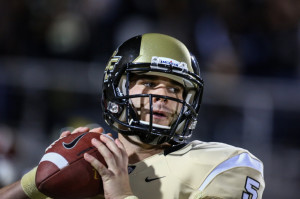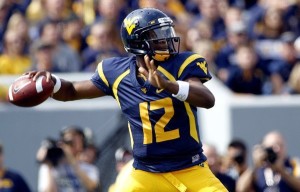by Chase Stuart
on March 12, 2016

Worse than Tim Couch
was drafted by Cleveland with the 22nd pick in the 2014 NFL Draft. That wasn’t a very long time ago, but Manziel was released yesterday after two tumultuous seasons. He went 2-6 as a starter with more off-the-field headlines than wins (or, probably, starts). There were 50 quarterbacks who threw 200 passes since 2014, and Manziel ranks
47th among those players in Adjusted Net Yards per Attempt.
Let’s ignore Eli Manning and Philip Rivers, who were traded for each other the day both players were drafted. And Kelly Stouffer, Jim Everett, and John Elway, who couldn’t work out contracts with the teams that drafted them (Cardinals, Oilers, Colts) and instead began their playing careers with other teams (Seahawks, Rams, and Broncos). That leaves 95 quarterbacks drafted in the first round since the common draft began in 1967.
Manziel became the 9th of those 95 quarterbacks to finish with zero, one, or two wins with the team that drafted him. [continue reading…]
Tagged as:
Johnny Manziel
{ }
by Chase Stuart
on September 22, 2015
This week at the New York Times, a look at how four young quarterbacks gave their team’s long-suffering fans some hope:
Bortles helped the Jaguars upset the Miami Dolphins, 23-20, courtesy of a number of big plays. Bortles was responsible for eight plays of at least 15 yards, including a 28-yard scramble on one third down. A second-year quarterback, he was responsible for 76 percent of Jacksonville’s yards on the day, and helped drive the team to the game-winning field goal.
Carr was responsible for 83 percent of Oakland’s offensive output on a day in which the Raiders were extremely pass-happy. Carr saved his best work at the end of the game: Taking over at his 20-yard line, trailing by 33-30 with 2 minutes 10 seconds remaining, Carr marched the Raiders to the game-winning score. He was seven for nine for 65 yards, and connected with Seth Roberts for a 12-yard touchdown with 26 seconds remaining.
You can read the full article here.
Arizona Is 14-2 In Carson Palmer’s Last 16 Games
Part II this week focuses on Arizona, which has been one of the best teams in football when Palmer stays healthy.
Expectations were not very high for the Cardinals entering 2015, despite the return of their starting quarterback, Carson Palmer. But through two weeks, the Cardinals lead the N.F.L. with 79 points. And dating to the 2013 season, Arizona has a 14-2 record and has outscored its opponents by 160 points in its last 16 games started by Palmer. Over that stretch, Palmer has completed 365 of 568 passes for 4,479 yards and 32 touchdowns with just 12 interceptions in what amounts to a full season’s worth of action. In other words, Arizona with a healthy Palmer deserves to be in the discussion for best team in the league.
You can read the full article here.
Tagged as:
Blake Bortles,
Carson Palmer,
Derek Carr,
Jameis Winston,
Johnny Manziel,
NYT
{ }
by Chase Stuart
on May 19, 2014
Interesting tidbit from Peter King this week about how the Vikings nearly acquired Johnny Manziel:
As the picks went by, starting soon after the Rams chose at 13, Cleveland GM Ray Farmer worked the phones, trying to find a partner to move up from their second pick in the round (26th overall) to grab Manziel. He couldn’t find a fit. Finally, with less than three minutes to go in Philadelphia’s 22nd slot, Farmer heard this from an Eagles representative over the phone: “If you’re not gonna jump in here, we’re gonna trade the pick right now.” It’s cloudy what his offer had been to this point, but now he had to sweeten it, and he offered the 83rd pick overall, a third-rounder, in addition to their pick four slots lower than Philly. Done deal. The Eagles liked that offer better than an offer from Minnesota, because the Vikings would have been moving up from 40.
As discussed in my round 1 recap, the Eagles made out like bandits picking up the 83rd pick to move down four spots. Not only did Philadelphia received 137 cents on the dollar according to my trade chart, but the Jimmy Johnson trade chart — which overvalues high picks and therefore cautions against trading down — had the Eagles receiving 112 cents on the dollar. [continue reading…]
Tagged as:
Blake Bortles,
Browns,
Jaguars,
Johnny Manziel,
Trades,
Vikings
{ }
by Chase Stuart
on May 15, 2014

A rare shot of Blake Bortles in a two-tone helmet.
The Jaguars drafted
Blake Bortles with the 3rd pick in the 2014 draft. Nineteen picks later, the Browns took
Johnny Manziel, and with the 32nd pick, the Vikings traded up to acquire
Teddy Bridgewater.
If you believe in the efficient market theory, this means Bortles is the most likely of that group to wind up being the top quarterback from this year’s draft. But I wanted to look at other drafts where the top quarterback was selected very early but the next quarterback wasn’t drafted in quick succession (like say, Andrew Luck and RG3).
Since 1967, the first year of the common draft, a quarterback was selected in the top 6 in 34 of 48 drafts. But in 22 of those 34 drafts, another team spent a top-12 pick on a quarterback, too.
That leaves 12 drafts where (a) a quarterback was drafted really, really early, and (b) no other quarterback went off the board for awhile (at least 14 picks between the quarterback selections in all 12 cases). Some further slicing, however, is required if we really want to do an apples-to-apples comparison. In six of those cases, a quarterback was selected with the number one overall pick, and based on research conducted by Jason Lisk, it doesn’t seem appropriate to compare quarterbacks not selected with the top pick to number one overall selections. I’d also throw out the 1973, 1976, and 1981 drafts, as the number two quarterbacks were all drafted after pick 30. [continue reading…]
Tagged as:
Blake Bortles,
Browns,
Jaguars,
Johnny Manziel
{ }
by Chase Stuart
on February 26, 2013

The Chiefs play the Baylor game on an endless loop for the other 31 teams.
A few weeks ago, I discovered
cfbstats.com, which has made available for download an incredible amount of college football statistics from the last eight seasons. Thanks to them, I plan to apply some of the same techniques I’ve used on NFL numbers over the years to college statistics. If you’re a fan of college football, you’re probably already reading talented writers like
Bill Connelly and
Brian Fremeau, but hopefully I can bring something new to the table for you to enjoy.
There are many differences between college and professional football, but many of the same stats still matter. For quarterbacks, Adjusted Net Yards per Attempt is still the king of the basic stats , and it is arguably even more important in college where teams play at varying different paces.
There’s a small problem, however, if you want to calculate ANY/A at the college level: the NCAA counts sacks as rush attempts and sack yards lost as negative rushing yards. I manually overrode that decision in my data set, so going forward, all rushing and passing data will include sack data in the preferred manner (keep this in mind when you compare the statistics I present to the “official” ones).
[continue reading…]
Tagged as:
Geno Smith,
Johnny Manziel,
Matt Barkley,
Tyler Bray
{ }



